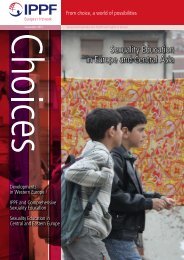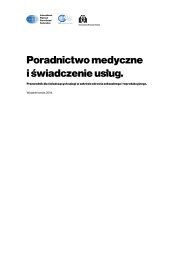Annual Report - IPPF - International Planned Parenthood Federation
Annual Report - IPPF - International Planned Parenthood Federation
Annual Report - IPPF - International Planned Parenthood Federation
You also want an ePaper? Increase the reach of your titles
YUMPU automatically turns print PDFs into web optimized ePapers that Google loves.
In a number of countries of Eastern<br />
Europe and Central Asia, the use<br />
of modern contraceptive methods<br />
such as the hormonal pill and intrauterine<br />
device (IUD) is alarmingly<br />
low.<br />
According to the UNPFA State of<br />
the World Population 2011 report<br />
1 there are 5 countries in our<br />
region (Albania, Armenia, Bosnia<br />
and Herzegovina, the Republic of<br />
Macedonia 2 and Serbia) where the<br />
average percentage use of modern<br />
contraception is lower than<br />
the average in the least-developed<br />
countries 3 in the world, and<br />
there are 15 countries where the<br />
levels are lower than the average<br />
percentage use of modern contraception<br />
in the less-developed<br />
regions 4 .<br />
Figures also show that a large<br />
proportion of women in many<br />
countries of the Eastern Europe<br />
Central Asia region are trying to<br />
avoid pregnancy using traditional<br />
methods such as periodic abstinence<br />
and withdrawal.<br />
In Albania, the majority of currently<br />
married women (59 percent)<br />
rely on traditional methods of<br />
contraception to delay or prevent<br />
a pregnancy; this is more than five<br />
times the proportion (11 percent)<br />
who use modern methods of contraception<br />
5 .<br />
In 2011, the <strong>IPPF</strong> EN Member Associations<br />
of Armenia, Bosnia and<br />
Herzegovina, Bulgaria, the Republic<br />
of Macedonia, Kazakhstan and<br />
Serbia together with a partner organisation<br />
in Azerbaijan undertook<br />
a qualitative analysis of behavioural<br />
patterns and cultural norms influencing<br />
contraceptive access and utilization.<br />
6 The study was managed<br />
and coordinated by the <strong>IPPF</strong> EN<br />
Regional Office with funding from<br />
the UNFPA Global Programme to<br />
enhance Reproductive Health<br />
Commodity Security.<br />
According to study findings,<br />
the use of modern methods of<br />
contraception in these middleincome<br />
countries is influenced<br />
by the following factors: perception<br />
of modern (hormonal)<br />
contraception as harmful; poor<br />
counselling; lack of government<br />
commitment to contraceptive<br />
security; cost; and a limited<br />
range of contraceptives available<br />
on the market, so restricting client<br />
choice.<br />
The outcomes of the study will<br />
be presented at a High Level<br />
Meeting to be held in 2012. The<br />
recommendations will hopefully<br />
result in the development of an<br />
action plan for the Member Associations<br />
to work together with<br />
their governments to improve the<br />
situation.<br />
Reaching young, poor and<br />
vulnerable people<br />
As part of <strong>IPPF</strong>’s ‘Global Comprehensive<br />
Abortion Initiative’ (GCA<br />
CI), <strong>IPPF</strong> EN Regional Office continued<br />
to provide technical support<br />
and capacity building to its Member<br />
Association of Kyrgyzstan to<br />
<strong>IPPF</strong> EN <strong>Annual</strong> <strong>Report</strong> 2011 Highlights DELIVER | 11<br />
Access for all to reduce the unmet need for sexual and reproductive health services<br />
1 UNFPA, State of the World Population, 2011<br />
2 UN technical reference “The Former Yugoslav Republic of Macedonia”<br />
3 Leastdeveloped according to standard UN designation<br />
4 According to UNFPA, State of the World Population, 2011, Lessdeveloped regions comprise all regions of Africa, Latin America and Caribbean, Asia (excluding Japan) and Melanesia, Micronesia and Polynesia<br />
5 According to latest DHD Survey<br />
6 “Key Factors influencing contraceptive use in 7 middleincome countries” is available from <strong>IPPF</strong> EN website via: http://www.ippfen.org/en/Resources/Publications/Key+factors+influencing+contraceptive+use.htm<br />
“the doctor says withdrawal is better than<br />
the iuD as the iuD is not suitable for women<br />
under age of 32.”<br />
A young woman from Azerbaijan; extract from “Key Factors influencing<br />
contraceptive use in 7 middle-income countries”<br />
deliver highquality abortionrelated<br />
services. The Member Association<br />
also benefited from the<br />
introduction and implementation<br />
of an electronic clinic management<br />
information system (eCMIS)<br />
to improve the overall clinic performance<br />
and quality of care for the<br />
provision of services.<br />
As a result, RHAK, have now firmly<br />
established themselves in their<br />
country as expert providers and<br />
enablers of comprehensive abortion<br />
care.





